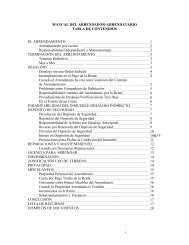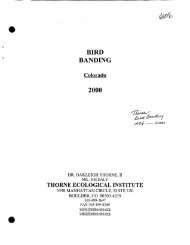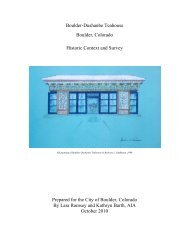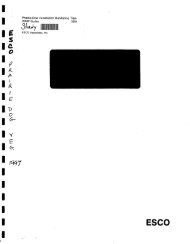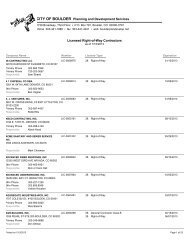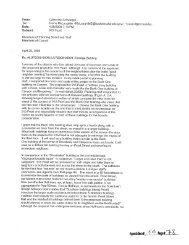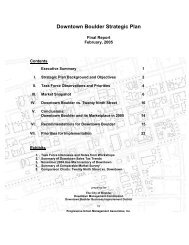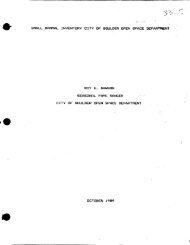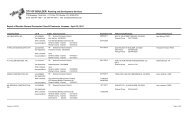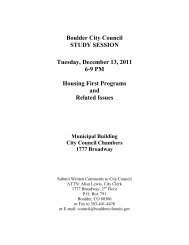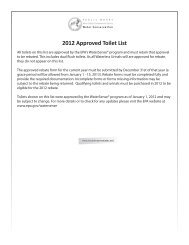Suzy Ageton George Karakehian KC Becker Tim ... - City of Boulder
Suzy Ageton George Karakehian KC Becker Tim ... - City of Boulder
Suzy Ageton George Karakehian KC Becker Tim ... - City of Boulder
Create successful ePaper yourself
Turn your PDF publications into a flip-book with our unique Google optimized e-Paper software.
intent to tax all s<strong>of</strong>tware purchased for use in the city, regardless <strong>of</strong> whether it is<br />
downloaded or purchased on a disk.<br />
We do not believe that the amendment would be subject to the Colorado Taxpayer Bill <strong>of</strong><br />
Rights and therefore require a public vote. The relevant TABOR language is as follows:<br />
[D]istricts must have voter approval in advance for . . . any new tax, tax rate increase,<br />
mill levy above that for the prior year, valuation for assessment ratio increase for a<br />
property class, or extension <strong>of</strong> an expiring tax, or a tax policy change directly causing a<br />
net tax revenue gain to any district.<br />
Colorado Const. Art. 10, § 20 (4)(a)(emphasis added).<br />
Amending the ordinance would not be a tax policy change. The city has consistently<br />
construed this ordinance to apply to downloaded s<strong>of</strong>tware and database access. While the<br />
court’s decision rejected this interpretation, the amendment would not be a change in the<br />
city’s tax policy. The Colorado Supreme Court has explained that “tax policy change” is<br />
“an undefined ‘catch-all’ phrase attempting to encompass any district action that is the<br />
equivalent <strong>of</strong> a new tax or a tax rate change that would not be covered by the more<br />
specific requirements listed before it.” Mesa County v. State, 203 P.3d 519, 529 (Colo.<br />
2009). The amendment would not be the equivalent <strong>of</strong> a new tax, but a clarification <strong>of</strong><br />
the city’s intent with respect to an old tax.<br />
In addition, to be subject to TABOR, the tax policy change must cause “a net tax revenue<br />
gain.” In Mesa County, the Court held that TABOR’s voter approval requirements do not<br />
apply to policy modifications that would have only a de minimis impact on a district’s<br />
revenues. Requiring an election for a de minimis revenue gain would “make any<br />
legislative action in the revenue arena nearly impossible and cripple the government’s<br />
ability to function.” The Court provided little guidance as to what constituted a de<br />
minimis revenue gain. It simply stated that the voters could not have intended, when<br />
passing TABOR, that the government be required to hold elections that cost more than<br />
the additional revenue obtained. Id. Since the city has always collected this tax, the<br />
amendment would yield no new revenue above that previously collected. Thus, the<br />
amendment would not result in a “net tax revenue gain.”<br />
ANALYSIS<br />
The council’s decision in 1981 to tax s<strong>of</strong>tware involved an intense public process and<br />
faced significant opposition from the business community. Nevertheless, the council<br />
decided to tax s<strong>of</strong>tware. The clarification to include “computer instructions” to the<br />
definition in 1999 was considered a housekeeping item by council. The Ball Aerospace<br />
decision will ultimately eliminate this tax as most if not all s<strong>of</strong>tware is downloaded over<br />
the internet. Council can choose to acquiesce and not clarify its intent or adopt the<br />
proposed ordinance to clarify that the tax does not depend on the method <strong>of</strong> delivery.<br />
ATTACHMENT A Proposed Ordinance.<br />
K:\FIAD\First Read Agenda memo S<strong>of</strong>tware Ord.-.doc<br />
Agenda Item 3M Page 4



